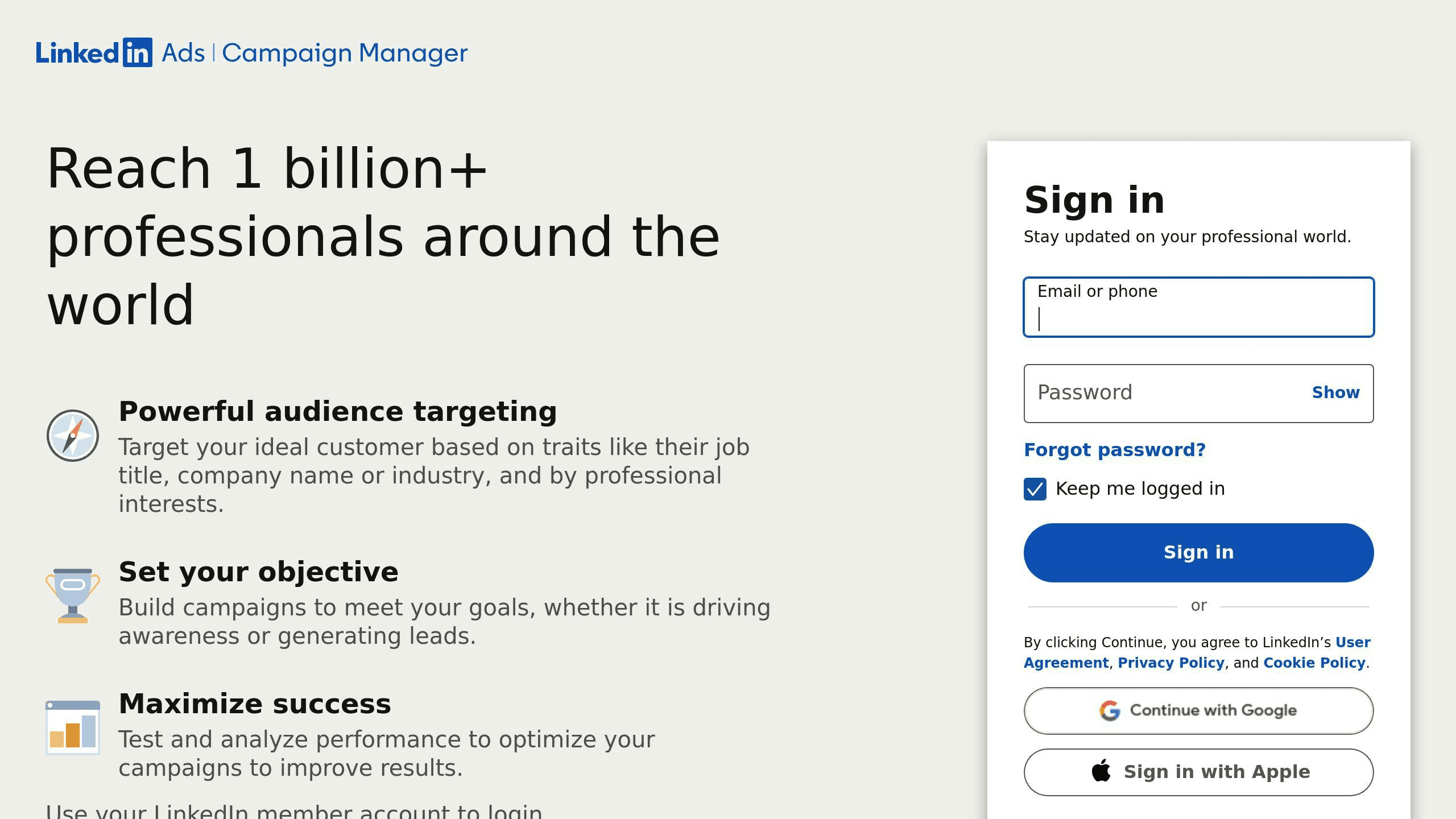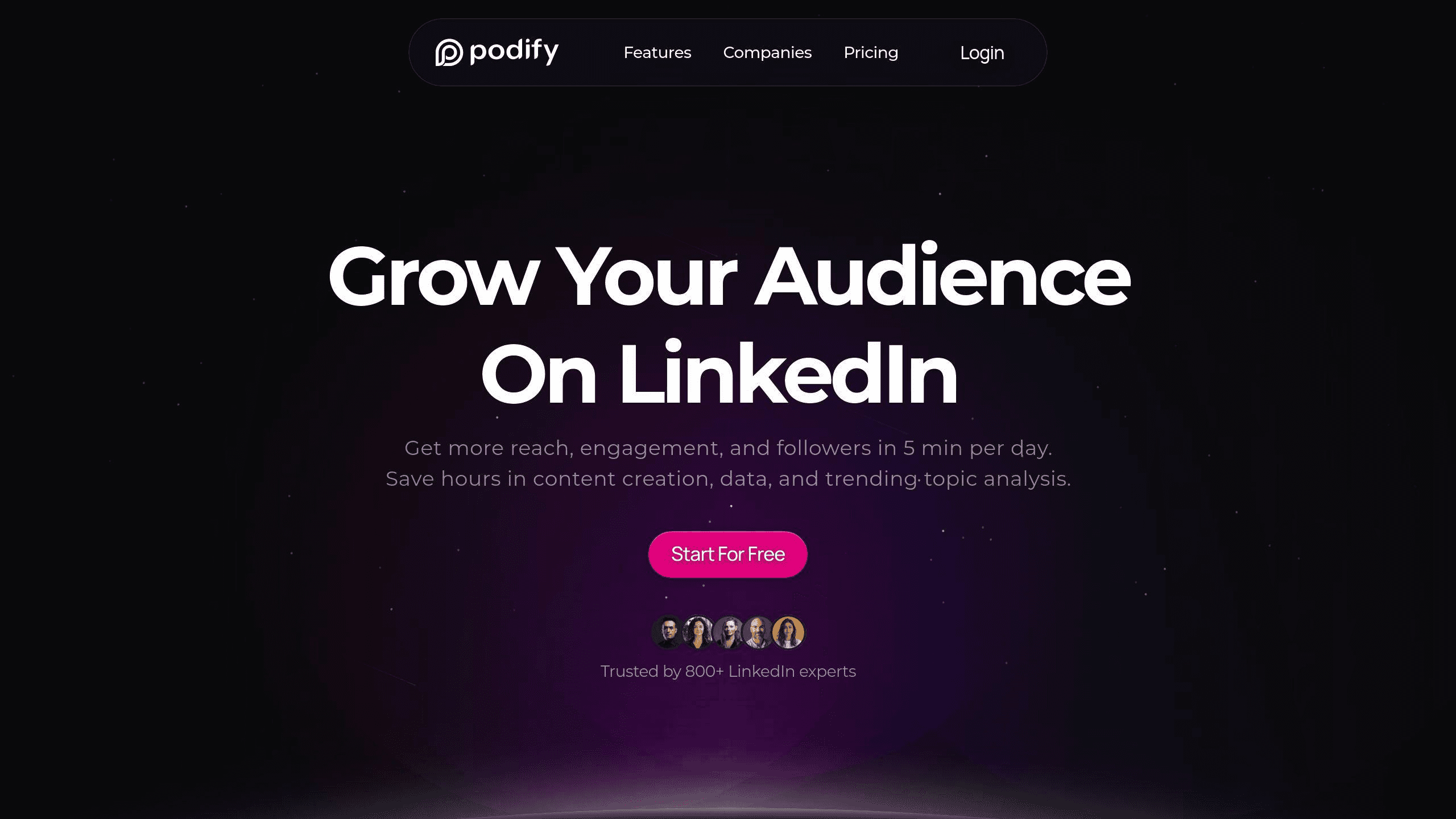LinkedIn Tips
Dec 6, 2024
●
9
min
LinkedIn Matched Audiences: Setup Guide 2024
Want to target the right audience for your B2B campaigns on LinkedIn? LinkedIn Matched Audiences lets you use your customer data, website visitors, or account lists to create precise audience segments. Here's a quick overview of how it works and how to set it up:
What It Does: Helps B2B companies target decision-makers and professionals using contact lists, website retargeting, or account-based targeting.
Setup Steps: Use LinkedIn's Campaign Manager to upload email lists, track website visitors with the Insight Tag, or target specific companies.
Key Requirements: Minimum audience size of 300 members for privacy and effectiveness, with CSV file uploads for contact and account targeting.
Tools to Use: Integrate CRMs like Marketo or HubSpot to keep audience data updated and campaigns relevant.
Advanced Features: Use predictive audiences, A/B testing, and tools like Podify.io to improve targeting and campaign performance.
How to Set Up LinkedIn Matched Audiences
Getting Started with Campaign Manager

To begin, click 'Advertise' on your LinkedIn homepage to open Campaign Manager. This is LinkedIn's tool for managing audiences and creating ad campaigns. Once inside, select your account name and campaign group to continue.
Make sure you have admin access to your company's ad account, as this is required to proceed.
Steps to Create a New Audience
After getting familiar with Campaign Manager, you're ready to create your custom audience. Here's how:
Click the "Create audience" button, and you'll see three main targeting options:
When choosing your audience type, think about your campaign goals and the data you have available. LinkedIn requires a minimum of 300 members in a matched audience to protect privacy and ensure effective targeting.
Uploading and Managing Audience Lists
Before uploading your audience lists, make sure they're properly formatted. LinkedIn has specific requirements for processing:
Prepare your data: Create a single-column CSV file with headers.
Match names exactly: Ensure company names align perfectly with their LinkedIn page names.
Size limits: Include between 300 and 300,000 records.
For smoother list management, consider integrating your CRM with LinkedIn using tools like Marketo. This can save time and keep your audience data current. Regularly check your audience size in Campaign Manager to ensure you're meeting LinkedIn's targeting requirements.
Targeting Options in LinkedIn Matched Audiences
Using Website Retargeting
The LinkedIn Insight Tag is a small piece of code you add to your website. It tracks visitor behavior and enables retargeting. Once installed and verified, it starts working immediately, helping you target audiences based on their activity on your site.
You can create audience segments by focusing on specific website URLs:
For example, you can target visitors who read your blog (domain.com/blog/), check out your pricing page (/pricing), or land on a thank-you page after converting (/thank-you).
While website retargeting focuses on tracking anonymous visitor behavior, contact targeting lets you directly engage with specific individuals.
Targeting Specific Contacts
Contact targeting allows you to connect directly with known prospects or customers on LinkedIn. To use this feature, upload a CSV file containing a single column of email addresses. LinkedIn will then match these emails to user profiles, typically achieving a match rate of 30% to 60%, depending on whether users have linked their business emails to their LinkedIn accounts.
When setting up contact-based audiences, keep these factors in mind:
If your goal is to target entire companies rather than individuals, account-based targeting is a better fit.
Account-Based Targeting Explained
Account-based targeting is ideal for B2B campaigns aimed at decision-makers within specific companies. This approach allows you to engage multiple stakeholders within your target accounts.
To make the most of account-based targeting, upload accurate company names, focus on decision-makers by seniority, and narrow down by job functions to reach the right departments. For even better results, integrate your targeting with marketing automation tools. This ensures your audience lists stay updated as your target accounts grow or shift.
Tips for Running Successful Campaigns
Keep Your Data Accurate
Having precise data is key to running effective LinkedIn campaigns. Incorrect or outdated information can lead to poor targeting and wasted ad spend.
Track and Improve Campaigns
Use LinkedIn's Campaign Manager to monitor KPIs and fine-tune your campaigns. Focus on these metrics to guide your adjustments:
To expand your audience and boost engagement, you can also explore tools like Podify.io for additional support.
Boosting Audience Growth with Podify.io

Podify.io complements your LinkedIn campaigns by offering tools that analyze your audience and enhance the impact of Matched Audiences. These features help refine how you target and distribute content.
For $27/month, Podify.io's Growth plan includes tools like ICP outreach and viral post features to help you expand your matched audiences organically.
"Using predictive audiences alongside regular campaign monitoring can help target users who have shown interest in similar products or services, significantly improving conversion rates", explains LinkedIn's Campaign Manager documentation.
Advanced Techniques for LinkedIn Matched Audiences
Using Predictive Audiences
Predictive modeling on LinkedIn uses algorithms to analyze past data and predict future customer behavior. This feature helps uncover potential customers who share key traits with your best-performing clients. Unlike basic audience expansion, predictive modeling digs deeper into behavioral patterns, leading to more precise targeting.
To make the most of predictive audiences, connect your CRM to keep your data accurate and actionable.
Connecting with CRM and Marketing Tools
Linking your CRM with LinkedIn Matched Audiences simplifies audience management and ensures your data stays reliable. Popular tools like Marketo and HubSpot can typically be integrated within a few days.
After optimizing your audience and data, run tests to fine-tune your campaigns.
Testing Campaigns with A/B Testing
A/B testing is essential for refining your campaigns, helping you compare audience segments and targeting strategies. Focus on these key elements for better results:
How To Create Matched & Saved Audiences in LinkedIn Ads - 2024
Using LinkedIn Matched Audiences in 2024
LinkedIn Matched Audiences offers precise B2B targeting, making it a powerful tool for marketers in 2024. To ensure campaigns are effective, LinkedIn requires a minimum audience size of 300 members. However, aiming for lists of around 1,000 records strikes the right balance between precision and reach, enabling better segmentation and higher engagement.
Boosting Campaign Performance with Matched Audiences
To get the most out of LinkedIn Matched Audiences, focus on these core strategies:
Scaling your campaigns effectively requires a structured approach to audience management. Tools like Podify.io can simplify this process, offering advanced analysis and content distribution options. This is particularly helpful for expanding your reach without losing targeting accuracy.
Key tips for success:
Regularly update your audience lists to keep data fresh.
Use a mix of targeting methods to expand reach while staying relevant.
Monitor performance metrics to fine-tune your strategy.
Integrate LinkedIn campaigns with your existing marketing tools.
FAQs
Here are some quick answers to common questions about LinkedIn Matched Audiences, covering key requirements and best practices.
What is the minimum audience size for LinkedIn retargeting?
LinkedIn requires at least 300 members per audience, with processing times varying by targeting type. Here's a breakdown:
To get the best results, aim for audiences of 1,000 or more. This helps you reach a broader audience while keeping your targeting precise and effective.
For accurate audience matching:
Keep file sizes under 20MB
Use exact company names as they appear on LinkedIn
Regularly update your lists
"LinkedIn's targeting guidelines emphasize that the 300-member minimum ensures privacy, statistical relevance, and better campaign results."
To manage your audiences more efficiently, you can integrate LinkedIn campaigns with CRM tools like Marketo. Tools like Podify.io are also useful for analyzing audiences and distributing content, especially when you're scaling beyond the basics.
Share Post
